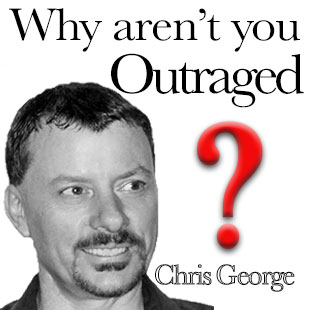
(CHRIS GEORGE / iNFOnews.ca)
December 04, 2018 - 12:07 PM
OPINION
I have always been passionate about the plight of wild salmon. From the first time almost stepping on a spring while hiking up a wild river in the mountains of the North Thompson to my first visit to the sockeye run at Adams River when I was a kid, they have fascinated me.
They may not be as iconic as an eagle or a bear in this province but they feed both of those species as well as the forests we live in.
So imagine my horror as an adult to have to watch as our once teeming rivers have suffered the death from a thousand cuts, each and every slice the result of human activity on land and sea.
The rivers of the North Pacific are still among the most vigorous in the world when it comes to wild salmon. The Russian Far East, Alaska, and British Columbia still have viable wild salmon fisheries. Other places in the world have not been so lucky. Scotland's famous inland sports fishery just suffered one of its worst years yet with no fish recorded being caught in some areas.
The pressures from human activity on wild salmon revolve primarily around our impacts on the different habitats that they call home during the different phases of their life cycle. Logging in British Columbia is one of the primary drivers of habitat loss. The increased runoff from cut blocks pushes sand and silt into the rivers and streams, ruining the spawning beds.
The loss of the foreshore on our large lakes to development has dealt a serious blow to young salmon as they rely on this large riparian area to build up their reserves in preparation for their journey to the ocean. It is unfortunate for them that this same area is prized by humans for recreation and status seeking.
Much of the current problems in different parts of the world including Alaska as well as Scotland have been attributed to climate change, primarily the warming waters in the oceans and in some streams. But the largest impacts definitely stem from the activities of the salmon farming industry.
It is no coincidence that the west coast of Scotland, where the recent collapse of the sports fishery occurred, is also home to much of Scotland's salmon farming operations. Sea lice and escaped fish have had a devastating impact on local wild runs.
What is happening in Scotland and in Norway give us a pretty good idea of what is happening here, even as the federal Department of Fisheries and Oceans (DFO) continues to work both sides of the fence by promoting fish farming while protecting wild salmon. This has led to paralysis as no one wants to do the hard work required to prove one way or another that the costs of the fish farms outweigh the benefits.
DFO has definitely botched this file, in different ways than they botched the cod on the east coast but with likely the same end result.
The response of our provincial governments over the past thirty years since fish farming was brought in by the BC NDP in the nineties has been disappointing. The Cohen Commission of Inquiry into the Decline of Sockeye Salmon in the Fraser River, a multi-million dollar comprehensive examination of the causes of the decline in wild salmon stocks has been soundly ignored completely by both parties.
The BC Liberal response over the past two decades has been to accelerate the pace of forest removal and do nothing about other industrial threats to the Fraser watershed, most notably the lack of any consequences for the Mount Polley disaster. The BC NDP response hasn't changed since the moment they were booted into opposition in 2001; study the problem some more and hope they are never called to take action that will piss someone off.
Forestry, mining, and fish farms. Three industrial sectors that are all pulling far more resources from the land and sea than ever while providing fewer jobs for British Columbians than past generations would have ever thought possible. All while squeezing out the wild fishery, both commercial and sport in British Columbia.
I live in a wild salmon riding and the health of the ecosystem that sustains my community is at risk. There are examples of what is possible when it comes to conservation and restoration. The Fraser River runs are special though as the watershed they rely on also contains the resource wealth prized by humans.
It is time for action. No more panels. No more committees. Action.
— Chris George believes one measure of a just society is found in how well it balances fiscally conservative economics with social responsibility and environmental soundness in all of its living arrangements.
We welcome your comments and opinions on our stories but play nice. We won't censor or delete comments unless they contain off-topic statements or links, unnecessary vulgarity, false facts, spam or obviously fake profiles. If you have any concerns about what you see in comments, email the editor.
News from © iNFOnews, 2018